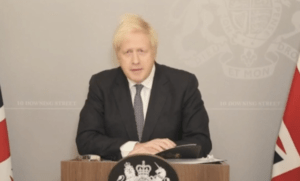Boris Johnson, backed by his chief medical adviser set an Easter “end goal” for coronavirus restrictions after trials showed that the Oxford vaccine was highly effective.
Chris Whitty agreed that it would be possible to “pull back” from social-distancing rules from the spring, with increasing hope in government that life would return to normal in the summer.
The announcement yesterday by the Oxford University team that their vaccine was up to 90 per cent effective means Britain has bought enough doses of three proven jabs to vaccinate the entire adult population next year. Mr Johnson said that “things really will look and feel very different indeed after Easter”.
The prime minister said that “with a favourable wind” it would be possible to vaccinate “the vast majority of the people who need the most protection by Easter”. He added: “That will make a very substantial change to where we are at the moment.”
He urged people to stick with restrictions through what he acknowledged would be a hard winter, promising that by the spring a combination of vaccines and testing would “make the whole concept of a Covid lockdown redundant”.
A downward trend in cases continued yesterday with 15,450 confirmed, the fewest for six weeks. A further 206 deaths were reported, similar to 213 a week ago, with 1,628 further Covid-19 patients admitted to hospital.
The three vaccines that have reported results have proved far more effective than Professor Whitty had been expecting and he is now more confident that once winter is over, tough restrictions on social life will not be needed.
Previously Professor Whitty has been much less optimistic than Mr Johnson — notably in rejecting the prime minister’s suggestion over the summer that life would be back to normal by Christmas — but yesterday he predicted a return to normal from the spring after praising the “remarkably good” vaccine results.
The Oxford jab prevented severe disease with no serious side-effects and there were early signs that it also stopped people passing on the virus.
“Science, and also the seasons when we get through to spring, will help to de-risk this infection steadily, step by step, and we’ll be able to pull back from these really oppressive things we have to do socially and economically, to keep it under control at the moment,” Professor Whitty told a Downing Street press conference.
He said that Covid would not disappear but “become less and less risky for society”. It would cause problems in winter but without the need “to do these things which cause such difficulties for everybody and such economic hardship for people”.
He is understood to believe that effective vaccines are likely in future years to make Covid more similar to seasonal flu, which kills thousands of vulnerable people every winter and requires mass vaccination, but does not restrict ordinary life for most people.
One official expressed confidence that music festivals and other mass events would be back next summer, saying: “I’m booking my Wimbledon tickets.”
Andrew Pollard, director of the Oxford Vaccine Group, said that his results were “an incredibly exciting moment for human health. We’ve got a vaccine which is highly effective. It prevents severe disease and hospitalisation . . . Because the vaccine can be stored at fridge temperatures, it can be distributed using the normal immunisation distribution system.”
Pointing out that all three vaccines that had so far reported prevented the need for hospital admission, he added: “Going back to the initial slogans about protecting the NHS — it may be that all the vaccines can do that.”
Adrian Hill, director of the Jenner Institute at Oxford University, where the vaccine was developed, told Times Radio that it could obtain regulatory approval by the middle of next month. He added: “There are probably going to be around four million doses. [But] I’m not sure we can distribute all of those in the last two weeks of December.
“Then there will be a lot more in January — my understanding is closer to tens of millions for the UK alone.”
The Oxford vaccine is expected to be considerably cheaper than alternatives. Astrazeneca aims to sell it for about $3 per shot, against an estimated $19.50 for the Pfizer drug. “[The] Oxford jab is far cheaper, and is easier to store and get to every corner of the world than the other two,” tweeted Peter Horby, a professor of emerging infectious diseases and global health at Oxford.
Mr Johnson told MPs that “the vaccines have unquestionably massively, massively improved our position” compared with a few weeks ago and held out the prospect of an Easter “end goal or date” to give people a timescale to work towards. “With luck and with hard work we will be seeing improvements before then,” he said.
However, Mr Johnson urged people to stick with tougher rules throughout the winter. “We can hear the drumming hoofs of the cavalry coming over the brow of the hill but they are not here yet,” he said. “Even if all three vaccines are approved, even if the production timetables are met, and vaccines notoriously fall behind in their production timetables, it will be months before we can be sure that we have inoculated everyone that needs a vaccine. And those months will be hard, they will be cold, they include January and February when the NHS is under its greatest pressure, and that is why when we come out of lockdown next week we must not just throw away the gains we have all made.”
